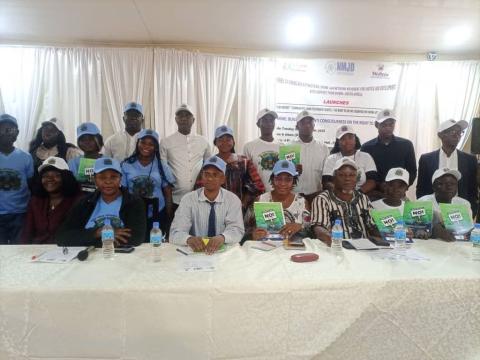By Abass Jalloh
With support from WOMIN (African Women Unite against Destructive Resource Extraction), the Women on Mining and Extractives (WoME) together with Network Movement for Justice and Development (NMJD) has launched a study report on community consent rights and the rights to say no to some projects that may affect particularly the livelihood of women in their various communities across Sierra Leone.
The report titled: “The Right Say No” was presented yesterday November 15 at the hall of the Council of Churches in Sierra Leone in Freetown by the Chief Policy Analyst in the Ministry of Mines and Mineral Resources, Alhaji Bah, and the Executive Director of WoME, Esther Finda Kandeh.
According to the report, the research was based on the premise that communities, and especilly women are denied the right to give or withhold their consent when it comes to large-scale extractive projects despite the existence of international and regional instruments, national laws and policies that protect them.
The report examines the basis for community consent rights across legal, institutional and policy framework at all levels which will inform decision-making and community advocacy pertaining to the disposal and use of land and natural resources held by a community within the context of mining, extractives,and women empowerment.
In understanding protection laws or legislation, the report also dealt with international treaties, regional and sub-regional legal, policy, and institutional frameworks.
In her statement, Ms Kandeh having acknowledged the concept, noted the ‘Right To Say No’ is “giving power to the people”, saying the land belongs to the people and that whatever activity is carried on it, the people should be informed and engaged to put them at the centre of any extractive activity that is going on.
She said: “The right of the people should be taken on board - the right to life, the right to water, the right to their livelihood - because when mining takes place, you are taking the land from them, their livelihood, and dignity. So because you are taking away those things from them they should be involved and give their consent.”
The Executive Director of NMJD, Abu Brima, stated that Sierra Leone has a potential of associating itself on extractive activities with the aim of making profit, business, and investment.
“Civil society, we are concerned. Sierra Leone is one of the countries that has been involving in mining activities for long. We are still extracting, but we have not seen the value of this extraction and what it has done to Sierra Leone. We should extract in a way that it will not cause destruction,” Brima stated.
He said the report would inform especially the Mines and Mineral Resources Minister of what they should do to prevent these situations and it is also an opportunity to engage with civil society on the concept of rights of citizens in mining communities.
Copyright © 2022 Politico Online (16/11/22)








